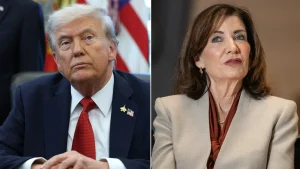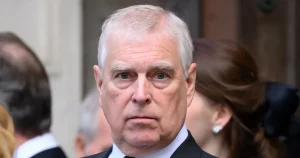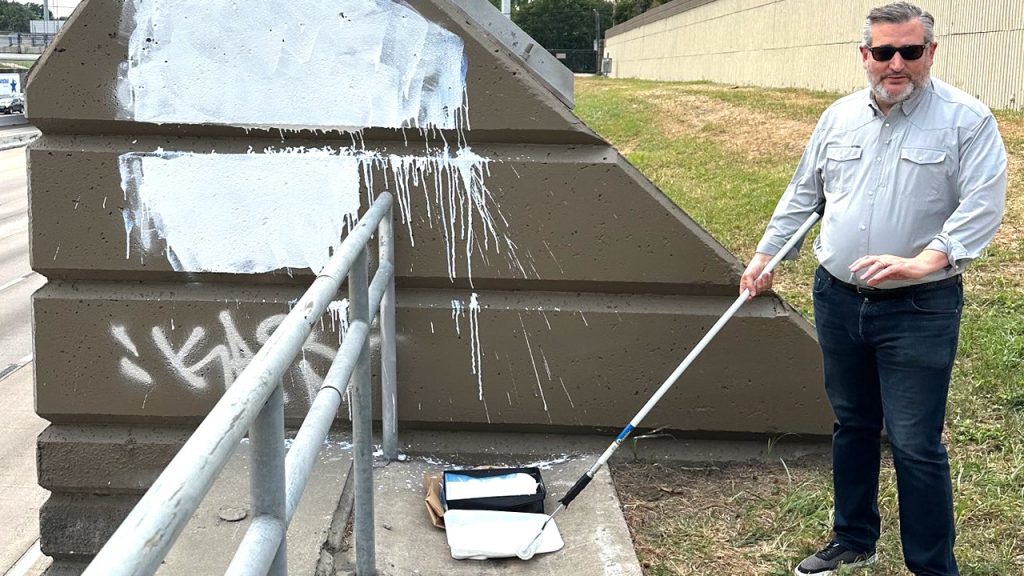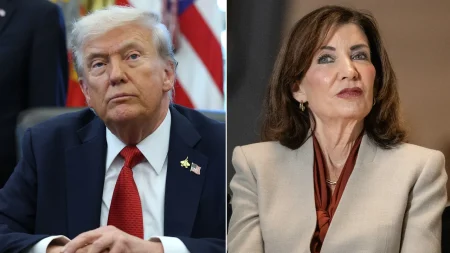Senator Cruz Personally Removes Hateful Graffiti Targeting Slain Conservative Activist
In a poignant act of personal intervention, Senator Ted Cruz took direct action this weekend after discovering offensive graffiti directed at the late Charlie Kirk along Houston’s Highway 59. Cruz, armed with paint supplies, personally covered the vulgar message that included profanity alongside the name of the conservative activist who was recently assassinated in Utah. “Some deranged bastard put this graffiti on the 59 freeway in Houston,” Cruz explained on social media. While noting that Texas Department of Transportation had been notified and would handle formal removal, the senator felt compelled to immediately address what he called “hateful garbage” rather than leaving it visible to passing Houston families and commuters.
The senator’s impromptu cleanup was captured on video which he later shared on his social media platforms with the simple caption “Erasing evil.” The footage shows Cruz methodically painting over the offensive message, taking personal responsibility rather than waiting for government services to address it. This hands-on approach resonated with many online, including business magnate Elon Musk who responded with an American flag emoji, seemingly signaling approval of the senator’s direct action. State Department spokesperson Tammy Bruce also publicly commended Cruz on her personal social media account, writing “Well done. Thank you from all of us” accompanied by clapping hands emojis and patriotic symbols.
Kirk, a prominent conservative activist and founder of Turning Point USA, had been a significant voice in American conservative politics before his shocking assassination last week. His death sent ripples through political circles, with memorials being held across the country including a major gathering at the Kennedy Center. Cruz had previously released a heartfelt statement describing Kirk as not just a political ally but a “close friend” who was “courageous, brilliant, compassionate, and powerfully honest.” This personal connection helps explain why the senator felt so strongly about removing the disrespectful graffiti, seeing it as an extension of the tragedy and a further injury to Kirk’s memory and legacy.
The incident highlights the increasingly tense political climate in America, where polarization has escalated beyond rhetorical disagreements to instances of violence and public disrespect. Kirk’s assassination has become a flashpoint in discussions about political discourse, with many conservatives pointing to what they see as increasingly hostile rhetoric directed at right-wing figures. House Republicans have strongly condemned those celebrating Kirk’s death, with one representative stating such individuals “must be thrown out of civil society.” The graffiti that Cruz removed appears to fall into this category of celebration or mockery of a political opponent’s death, crossing what many see as a fundamental line of human decency regardless of political differences.
Cruz’s action also reflects a growing trend of politicians taking direct, visible action on issues rather than simply delegating or commenting. By physically removing the offensive content himself, Cruz demonstrated both personal conviction and a willingness to engage beyond words. This form of political communication through direct action often resonates differently with constituents than traditional statements or policy positions. The senator’s choice to document and share the removal process amplified his message about respecting the deceased regardless of political affiliation, while simultaneously highlighting his hands-on approach to representing Texas values.
The reaction to Cruz’s intervention has been largely supportive across political lines, with many appreciating the basic human decency of removing hateful messages targeting someone who was recently killed, regardless of political disagreements. The incident serves as a reminder that despite deep political divisions, there remain certain boundaries of respect and dignity that most Americans believe should be maintained, particularly regarding the treatment of the deceased. As communities continue to process Kirk’s assassination and its implications for political discourse, Cruz’s small act of removing offensive graffiti stands as a gesture toward maintaining basic civility in increasingly uncivil times—a practical demonstration that some actions should transcend partisan divides.















